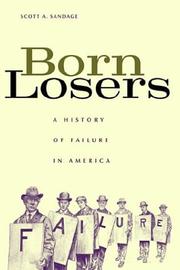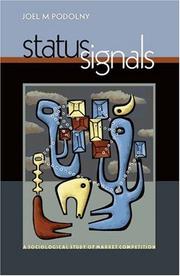| Listing 1 - 10 of 14 | << page >> |
Sort by
|
Book
ISBN: 9780128092941 0128092947 9780128053713 0128053712 Year: 2018 Publisher: London, England : Academic Press,
Abstract | Keywords | Export | Availability | Bookmark
 Loading...
Loading...Choose an application
- Reference Manager
- EndNote
- RefWorks (Direct export to RefWorks)
The Handbook of Social Status Correlates summarizes findings from nearly 4000 studies on traits associated with variations in socioeconomic status. Much of the information is presented in roughly 300 tables, each one providing a visual snapshot of what research has indicated regarding how a specific human trait appears to be correlated with socioeconomic status. The social status measures utilized and the countries in which each study was conducted are also identified.--
Social status. --- Social classes. --- Class distinction --- Classes, Social --- Rank --- Caste --- Estates (Social orders) --- Social status --- Class consciousness --- Classism --- Social stratification --- Social standing --- Socio-economic status --- Socioeconomic status --- Standing, Social --- Status, Social --- Power (Social sciences) --- Prestige


ISBN: 069111756X 0691117578 9786612158810 1282158813 140082611X 9781400826117 9780691117577 9780691117560 9780691117577 Year: 2009 Publisher: Princeton, NJ
Abstract | Keywords | Export | Availability | Bookmark
 Loading...
Loading...Choose an application
- Reference Manager
- EndNote
- RefWorks (Direct export to RefWorks)
This book presents results of a cross-national research project on self-employment in eleven advanced economies and demonstrates how and why the practice is reemerging in modern societies. While traditional forms of self-employment, such as skilled crafts work and shop keeping, are in decline, they are being replaced by self-employment in both professional and unskilled occupations. Differences in self-employment across societies depend on the extent to which labor markets are regulated and the degree to which intergenerational family relationships are a primary factor structuring social organization. For each of the eleven countries analyzed, the book highlights the extent to which social background, educational attainment, work history, family status, and gender affect the likelihood that an individual will enter--and continue--a particular type of self-employment. While involvement with self-employment is becoming more common, it is occurring for individuals in activities that are more diverse, unstable and transitory than in years past.
Self-employed. --- Equality. --- Social status. --- Travailleurs indépendants --- Egalité (Sociologie) --- Statut social --- Travailleurs indépendants --- Egalité (Sociologie) --- Social standing --- Socio-economic status --- Socioeconomic status --- Standing, Social --- Status, Social --- Egalitarianism --- Inequality --- Social equality --- Social inequality --- Free-lancers --- Freelancers --- Power (Social sciences) --- Prestige --- Political science --- Sociology --- Democracy --- Liberty --- Persons

ISBN: 0674016564 1684174074 9780674016569 9781684174072 Year: 2004 Volume: 243 Publisher: Boston : Leiden; Boston : Harvard University Asia Center, BRILL,
Abstract | Keywords | Export | Availability | Bookmark
 Loading...
Loading...Choose an application
- Reference Manager
- EndNote
- RefWorks (Direct export to RefWorks)
Bureaucracy --- Social structure --- Social status --- History --- Korea --- -Social structure --- -Social status --- -K9321 --- K9300.60 --- Social standing --- Socio-economic status --- Socioeconomic status --- Standing, Social --- Status, Social --- Power (Social sciences) --- Prestige --- Organization, Social --- Social organization --- Anthropology --- Sociology --- Social institutions --- Interorganizational relations --- Political science --- Public administration --- Organizational sociology --- History. --- Korea: Communities, social classes and groups -- social class and class systems --- Korea: Social sciences -- social and cultural history -- modern period (1860s-[1945]), 20th century general --- Chosŏn dynasty, 1392-1910. --- K9321
Periodical
Abstract | Keywords | Export | Availability | Bookmark
 Loading...
Loading...Choose an application
- Reference Manager
- EndNote
- RefWorks (Direct export to RefWorks)
Social stratification --- Social mobility --- Occupational mobility --- Social status --- Social conflict --- Social classes --- Mobilité sociale --- Stratification sociale --- Mobilité professionnelle --- Statut social --- Lutte des classes --- Classes sociales --- Periodicals. --- Périodiques --- Conflits sociaux --- Occupational mobility. --- Social classes. --- Social conflict. --- Social mobility. --- Social status. --- Social Sciences --- Developmental Issues & Socioeconomic Studies --- General and Others --- Sociology. --- Anthropology --- Sociology --- Social Sciences. --- Mobilité sociale --- Mobilité professionnelle --- Périodiques --- EJSOCIA ELSEVIER-E EPUB-ALPHA-R EPUB-PER-FT --- Social standing --- Socio-economic status --- Socioeconomic status --- Standing, Social --- Status, Social --- Power (Social sciences) --- Prestige --- Mobility, Social --- Class conflict --- Class struggle --- Conflict, Social --- Social tensions --- Interpersonal conflict --- Social psychology --- Class distinction --- Classes, Social --- Rank --- Caste --- Estates (Social orders) --- Class consciousness --- Classism --- Job mobility --- Mobility, Occupational

ISBN: 0791418014 0791418022 0585044333 9780585044330 0791496724 Year: 1994 Publisher: Albany : State University of New York Press,
Abstract | Keywords | Export | Availability | Bookmark
 Loading...
Loading...Choose an application
- Reference Manager
- EndNote
- RefWorks (Direct export to RefWorks)
Labor --- Occupational prestige --- Social status --- Social surveys --- Travail --- Prestige professionnel --- Statut social --- Enquêtes sociales --- S11/0830 --- S11/0534 --- S11/0470 --- -Occupational prestige --- -Social status --- -Social surveys --- -#SBIB:39A75 --- #SBIB:39A4 --- Community surveys --- Surveys, Social --- Social sciences --- Surveys --- Social standing --- Socio-economic status --- Socioeconomic status --- Standing, Social --- Status, Social --- Power (Social sciences) --- Prestige --- Job status (Occupational prestige) --- Occupational hierarchy --- Occupational status (Occupational prestige) --- Labor and laboring classes --- Manpower --- Work --- Working class --- China: Social sciences--Labour conditions and trade unions: since 1949 --- China: Social sciences--Class studies --- China: Social sciences--Cities: since 1949 --- Etnografie: Azië --- Toegepaste antropologie --- Research --- Labor & Workers' Economics --- Business & Economics --- Enquêtes sociales --- #SBIB:39A75 --- E-books

ISBN: 067401510X 067402107X 0674043057 9780674043053 9780674021075 0674267028 9780674015104 Year: 2005 Publisher: Cambridge, Ma: Harvard university press,
Abstract | Keywords | Export | Availability | Bookmark
 Loading...
Loading...Choose an application
- Reference Manager
- EndNote
- RefWorks (Direct export to RefWorks)
This is a pioneering work of American cultural history, which connects everyday attitudes and anxieties about failure to lofty ideals of individualism and salesmanship of self. Sandage's storytelling will resonate with all of us as it brings to life forgotten men and women who wrestled with The Loser--the label and the experience--in the days when American capitalism was building a nation of winners.
Social values --- Losers --- Failure (Psychology) --- Capitalism --- Identity (Psychology) --- Stigma (Social psychology) --- Social status --- History --- Social aspects --- Valeurs sociales --- Perdants --- Echec (Psychologie) --- Capitalisme --- Stigmates (Psychologie sociale) --- Histoire --- Aspect social --- Social standing --- Socio-economic status --- Socioeconomic status --- Standing, Social --- Status, Social --- Power (Social sciences) --- Prestige --- Shame --- Social psychology --- Personal identity --- Personality --- Self --- Ego (Psychology) --- Individuality --- Market economy --- Economics --- Profit --- Capital --- Losing (Psychology) --- Psychology --- Fear of failure --- Success --- Values --- United States --- 19th century --- Social values - United States - History - 19th century --- Losers - United States - History - 19th century --- Failure (Psychology) - United States - History - 19th century --- Capitalism - Social aspects - United States - History - 19th century --- Identity (Psychology) - United States - History - 19th century --- Social status - United States - History - 19th century
Book
ISBN: 0300199155 9780300199154 9780300176728 0300176724 1306095271 9781306095273 9780300209389 030020938X Year: 2013 Publisher: New Haven : Yale University Press,
Abstract | Keywords | Export | Availability | Bookmark
 Loading...
Loading...Choose an application
- Reference Manager
- EndNote
- RefWorks (Direct export to RefWorks)
Social media technologies such as YouTube, Twitter, and Facebook promised a new participatory online culture. Yet, technology insider Alice Marwick contends in this insightful book, "Web 2.0" only encouraged a preoccupation with status and attention. Her original research-which includes conversations with entrepreneurs, Internet celebrities, and Silicon Valley journalists-explores the culture and ideology of San Francisco's tech community in the period between the dot com boom and the App store, when the city was the world's center of social media development. Marwick argues that early revolutionary goals have failed to materialize: while many continue to view social media as democratic, these technologies instead turn users into marketers and self-promoters, and leave technology companies poised to violate privacy and to prioritize profits over participation. Marwick analyzes status-building techniques-such as self-branding, micro-celebrity, and life-streaming-to show that Web 2.0 did not provide a cultural revolution, but only furthered inequality and reinforced traditional social stratification, demarcated by race, class, and gender.
Web 2.0. --- Social media. --- Social status. --- Celebrities. --- Publicity. --- Branding (Marketing) --- Brand name products --- Marketing --- Advertising --- Propaganda --- Public relations --- Celebrity culture --- Celebs --- Cult of celebrity --- Famous people --- Famous persons --- Illustrious people --- Well-known people --- Persons --- Fan clubs --- Social standing --- Socio-economic status --- Socioeconomic status --- Standing, Social --- Status, Social --- Power (Social sciences) --- Prestige --- User-generated media --- Communication --- User-generated content --- World Wide Web --- Web 2.0 --- Social media --- Social status --- Celebrities --- Publicity --- Médias sociaux --- Statut social --- Célébrités --- Publicité --- Stratégie de marque

ISBN: 9780691117003 0691117004 0691136432 9786612964992 1282964992 1400837871 9781400837878 9780691136431 Year: 2005 Publisher: Princeton, N.J. Princeton University Press
Abstract | Keywords | Export | Availability | Bookmark
 Loading...
Loading...Choose an application
- Reference Manager
- EndNote
- RefWorks (Direct export to RefWorks)
Why are elite jewelers reluctant to sell turquoise, despite strong demand? Why did leading investment bankers shun junk bonds for years, despite potential profits? Status Signals is the first major sociological examination of how concerns about status affect market competition. Starting from the basic premise that status pervades the ties producers form in the marketplace, Joel Podolny shows how anxieties about status influence whom a producer does (or does not) accept as a partner, the price a producer can charge, the ease with which a producer enters a market, how the producer's inventions are received, and, ultimately, the market segments the producer can (and should) enter. To achieve desired status, firms must offer more than strong past performance and product quality--they must also send out and manage social and cultural signals. Through detailed analyses of market competition across a broad array of industries--including investment banking, wine, semiconductors, shipping, and venture capital--Podolny demonstrates the pervasive impact of status. Along the way, he shows how corporate strategists, tempted by the profits of a market that would negatively affect their status, consider not only whether to enter the market but also whether they can alter the public's perception of the market. Podolny also examines the different ways in which a firm can have status. Wal-Mart, for example, has low status among the rich as a place to shop, but high status among the rich as a place to invest. Status Signals provides a systematic understanding of market dynamics that have--until now--not been fully appreciated.
Market segmentation --- Social status --- Target marketing --- 313 --- 330.00 --- 380.53 --- 658.7 --- AA / International- internationaal --- Verkopen. Marktonderzoek. Verkoopsbeleid. --- Ventes. Analyse des marchés. Politique de vente. --- Sales. Market research. Sales policy. --- 658.7 Verkopen. Marktonderzoek. Verkoopsbeleid. --- 658.7 Ventes. Analyse des marchés. Politique de vente. --- 658.7 Sales. Market research. Sales policy. --- Market targeting --- Target markets --- Marketing --- Social standing --- Socio-economic status --- Socioeconomic status --- Standing, Social --- Status, Social --- Power (Social sciences) --- Prestige --- Niche marketing --- Segmented market --- Social aspects --- Levenswijze en levensstandaard. Levensminimum. sociale indicatoren (Studiën) --- Economische en sociale theorieën: algemeenheden --- Analyse van de markten en verkooppolitiek. Handelsvooruitzichten. Marketing --- Verkopen. Marktonderzoek. Verkoopsbeleid --- Social stratification --- Market research --- Economics --- Markets --- Social networks. --- Social status. --- Social values. --- Social aspects. --- Values --- Networking, Social --- Networks, Social --- Social networking --- Social support systems --- Support systems, Social --- Interpersonal relations --- Cliques (Sociology) --- Microblogs --- Society and markets --- Economic sociology --- Socio-economics --- Socioeconomics --- Sociology of economics --- Sociology --- Sociological aspects. --- Social networks --- Social values --- Economie politique --- Cibles (Marketing) --- Réseaux sociaux --- Valeurs sociales --- Aspect social
Book
ISBN: 0812201426 0812221877 1322510520 Year: 2008 Publisher: Philadelphia : University of Pennsylvania Press,
Abstract | Keywords | Export | Availability | Bookmark
 Loading...
Loading...Choose an application
- Reference Manager
- EndNote
- RefWorks (Direct export to RefWorks)
In 1823, the History of the Celebrated Mrs. Ann Carson rattled Philadelphia society and became one of the most scandalous, and eagerly read, memoirs of the age. This tale of a woman who tried to rescue her lover from the gallows and attempted to kidnap the governor of Pennsylvania tantalized its audience with illicit love, betrayal, and murder.Carson's ghostwriter, Mary Clarke, was no less daring. Clarke pursued dangerous associations and wrote scandalous exposés based on her own and others' experiences. She immersed herself in the world of criminals and disreputable actors, using her acquaintance with this demimonde to shape a career as a sensationalist writer.In Dangerous to Know, Susan Branson follows the fascinating lives of Ann Carson and Mary Clarke, offering an engaging study of gender and class in the early nineteenth century. According to Branson, episodes in both women's lives illustrate their struggles within a society that constrained women's activities and ambitions. She argues that both women simultaneously tried to conform to and manipulate the dominant sexual, economic, and social ideologies of the time. In their own lives and through their writing, the pair challenged conventions prescribed by these ideologies to further their own ends and redefine what was possible for women in early American public life.
Social status --- Fame --- Crime --- Sex role --- Women authors, American --- Female offenders --- Women --- City crime --- Crime and criminals --- Crimes --- Delinquency --- Felonies --- Misdemeanors --- Urban crime --- Social problems --- Criminal justice, Administration of --- Criminal law --- Criminals --- Criminology --- Transgression (Ethics) --- Celebrity --- Renown --- Glory --- Social standing --- Socio-economic status --- Socioeconomic status --- Standing, Social --- Status, Social --- Power (Social sciences) --- Prestige --- Human females --- Wimmin --- Woman --- Womon --- Womyn --- Females --- Human beings --- Femininity --- Delinquent women --- Offenders, Female --- Women criminals --- Women offenders --- American women authors --- History --- Social aspects --- Clarke, Mary, --- Carson, Ann Baker. --- Smith, Ann, --- Philadelphia (Pa.) --- Philadelphie (Pa.) --- Filadelfia (Pa.) --- Filadelʹfii︠a︡ (Pa.) --- Филадельфия (Pa.) --- Philly (Pa.) --- City of Philadelphia (Pa.) --- Lower Dublin (Pa. : Township) --- Philadelphia County (Pa.) --- Social conditions --- Filadelfiyah (Pa.) --- פילדלפיה (Pa.) --- American History. --- American Studies. --- Gender Studies. --- Women's Studies.
Book
ISBN: 9789004206892 9004206892 9786613161888 1283161885 900420704X 9789004207042 9781283161886 6613161888 Year: 2011 Publisher: Leiden ; Boston : Brill,
Abstract | Keywords | Export | Availability | Bookmark
 Loading...
Loading...Choose an application
- Reference Manager
- EndNote
- RefWorks (Direct export to RefWorks)
Life at the Bottom of Babylonian Society is a study of the population dynamics, family structure, and legal status of publicly-controlled servile workers in Kassite Babylonia. It compares some of the demographic aspects proper to this group with other intensively studied past populations, such as Roman Egypt, Medieval Tuscany, and American slave plantations. It suggests that families, especially those headed by single mothers, acted as a counter measure against population reduction (flight and death) and as a means for the state to control this labor force. The work marks a step forward in the use of quantitative measures in conjunction with cuneiform sources to achieve a better understanding of the social and economic forces that affected ancient Near Eastern populations.
Travailleurs --- Statut social --- Working class --- Labor --- Social status --- Families --- Histoire --- History. --- Nippur (Extinct city) --- Babylonia --- Population --- History --- Social conditions. --- Economic conditions. --- Babylonia - Economic conditions. --- Babylonia - Social conditions. --- Demographic archaeology. --- Families - Iraq - Nippur (Extinct city) - History. --- Forced labor -- Iraq -- Nippur (Extinct city). --- Labor - Iraq - Nippur (Extinct city) - History. --- Nippur (Extinct city) - Economic conditions. --- Nippur (Extinct city) - History. --- Nippur (Extinct city) - Population - History. --- Nippur (Extinct city) -- Population. --- Nippur (Extinct city) - Social conditions. --- Slaves -- Iraq -- Nippur (Extinct city). --- Social status - Iraq - Nippur (Extinct city) - History. --- Working class - Iraq - Nippur (Extinct city) - History. --- Business & Economics --- Labor & Workers' Economics --- Family --- Family life --- Family relationships --- Family structure --- Relationships, Family --- Structure, Family --- Social standing --- Socio-economic status --- Socioeconomic status --- Standing, Social --- Status, Social --- Labor and laboring classes --- Commons (Social order) --- Laboring class --- Labouring class --- Working classes --- Social aspects --- Social conditions --- Employment --- Vavilonii︠a︡ --- Bavel --- Bābil --- Babylonien --- Niffer (Iraq) --- Nippur (Ancient city) --- Nuffar (Iraq) --- Social institutions --- Birth order --- Domestic relations --- Home --- Households --- Kinship --- Marriage --- Matriarchy --- Parenthood --- Patriarchy --- Power (Social sciences) --- Prestige --- Manpower --- Work --- Social classes --- Sumer --- Iraq --- Antiquities
| Listing 1 - 10 of 14 | << page >> |
Sort by
|

 Search
Search Feedback
Feedback About UniCat
About UniCat  Help
Help News
News